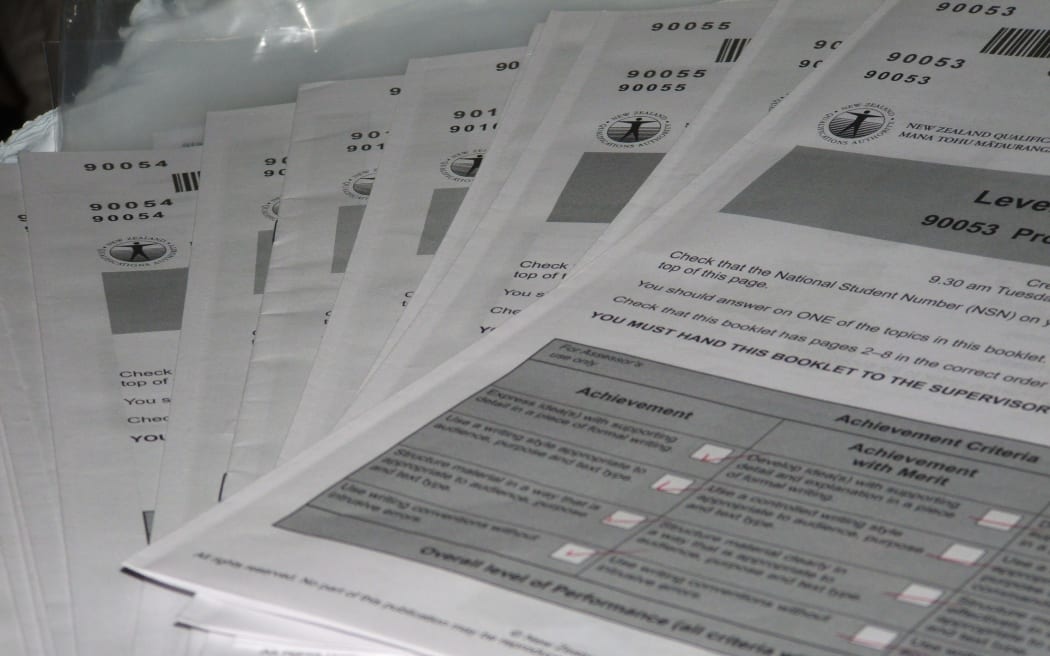
Schools have told RNZ of pass rates as low as zero for the writing test and about 50 percent for the numeracy test (file image). Photo: Supplied
The government has ruled out making NCEA literacy and numeracy tests easier to pass.
Some principals and teachers are alarmed that high-achieving students failed the tests during a trial run among Year 10 students in June.
Schools have told RNZ of pass rates as low as zero for the writing test and about 50 percent for the numeracy test.
Associate Minister of Education Jan Tinetti told Midday Report the tests were being fine-tuned but the government was "absolutely not" considering making the tests easier.
"What we are looking at is making changes to strengthen what our young people are learning through NCEA so it's not about that, it's about what supports can we put into schools to ensure that our young people are achieving at the levels they're supposed to be achieving at," she said.
Tinetti said she had seen the high-level results from the June trial of the tests and they showed some young people had not passed the tests.
"But the beauty of these particular assessments is that they can take them any time in their secondary schooling.
"It's a bit like your driver's licence. When you go for your driver's licence and you know what you're missing out on, you know what you have to practice on and that's exactly what these tests are doing in the literacy and mathematics space, identifying where young people have their gaps, what they need to do to meet those gaps and it's giving them that second chance."
Minister of Education Chris Hipkins said literacy and numeracy achievement had been declining for 20 years and the government was spending more to improve teaching of reading, writing and maths.
The online tests were still under development, he said.
"These are new standards that are just being put together and they're being trialled for the first time. One of the reasons that you trial things like this is to make sure that you are getting the standards set at the right level."

Education Minister Chris Hipkins Photo: RNZ / Marika Khabazi
From 2024, students must pass all three tests to get any level of the NCEA.
The results of this year's trial are due later this month but a small-scale trial last year resulted in pass rates of just 35 percent for writing, 65 percent for numeracy and 67 percent for reading.
The founder of the Education Hub, which connects teachers with education research, Nina Hood told Nine to Noon schools' reports of poor results from this year's trial were worrying but tallied with studies of New Zealand children's achievement.
"In some ways, it's not surprising, these results coming out. It is deeply worrying, however, because from my point of view ensuring that all students are leaving school with a good level of literacy and numeracy is absolutely essential in terms of their ongoing involvement within life and their chances within life," Dr Hood said.
National studies showed some teenagers were starting secondary school without the level of literacy and numeracy that was expected of their age group, she said.
"Once you get to the secondary school level, there are fewer interventions available to students so secondary schools have a huge task ahead of them to make sure that they are getting their students up to the standard and level that they need to be at."
James Cook High School principal Grant McMillan told Nine to Noon the tests were piloted on Year 10 students but when introduced in 2024, they would be sat mostly by Year 11 students.
The online nature of the tests narrowed what could be assessed and essentially came down to how well students could spell and type, McMillan said.
Some of the so-called literacy crisis was real, but a lot of it was driven by universities pushing their expectations on to schools even though most school students would not go to university, he said.
"We need to be very, very careful what we're expecting of students at level 1 [NCEA] which is just like your learner's driver licence. It doesn't actually get you anywhere but it's the first in the progression," McMillan said.
"We're not asking for things that are too high or demanding. It needs to be fair and appropriate. And I think right now we've probably pitched it a bit high."
He said he had asked the Qualifications Authority (NZQA) to run the trial tests again with students in Years 11,12 and 13 and first year university.
"I'd really like to see what age level or what qualification level can actually cope with and pass these tests en masse and I suspect it's slightly higher than we perhaps believe it might be."






